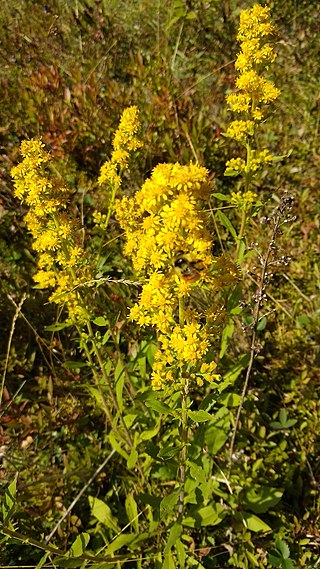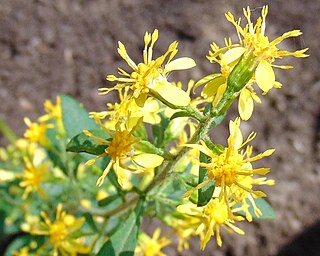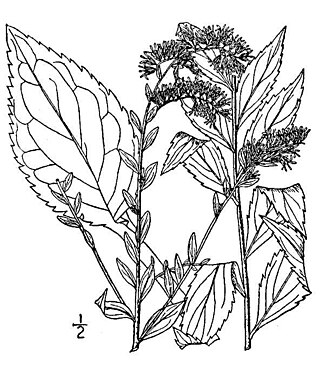
Solidago canadensis, known as Canada goldenrod or Canadian goldenrod, is an herbaceous perennial plant of the family Asteraceae. It is native to northeastern and north-central North America and often forms colonies of upright growing plants, with many small yellow flowers in a branching inflorescence held above the foliage. It is an invasive plant in other parts of the continent and several areas worldwide, including Europe and Asia. It is grown as an ornamental in flower gardens.

Solidago juncea, the early goldenrod, plume golden-rod, or yellow top, is a North American species of herbaceous perennial plants of the family Asteraceae native to eastern and central Canada and eastern and central United States. It grows from Nova Scotia west to Manitoba and Minnesota south as far as northern Georgia and northern Arkansas, with a few isolated populations in Louisiana and Oklahoma.

Solidago nemoralis is a species of flowering plant in the family Asteraceae. It is native to North America, where it is widely found in Canada and the United States. Its common names include gray goldenrod, gray-stem goldenrod, old-field goldenrod, field goldenrod, prairie goldenrod, dwarf goldenrod, and dyersweed goldenrod.

Solidago houghtonii is a rare North American species of flowering plant in the family Asteraceae known as Houghton's goldenrod. It is native to southern Ontario, Canada and the northern United States. It is threatened by the loss and degradation of its habitat. It is a federally listed threatened species of the United States and it is designated a species of special concern by Canada's Committee on the Status of Endangered Wildlife in Canada.

Solidago missouriensis is a species of flowering plant in the family Asteraceae known by the common names Missouri goldenrod and prairie goldenrod. It is native to North America, where it is widespread across much of Canada, the United States, and northern Mexico. It grows from British Columbia east to Manitoba, south as far as Sonora, Coahuila, Texas, and Mississippi.

Solidago puberula, the downy goldenrod, is a plant species native to eastern North America from Nova Scotia and Ontario south to Florida and Louisiana. Two subspecies are commonly recognized:

Solidago rigida, known by the common names stiff goldenrod and stiff-leaved goldenrod, is a North American plant species in the family Asteraceae. It has a widespread distribution in Canada and the United States, where it is found primarily east of the Rocky Mountains. It is typically found in open, dry areas associated with calcareous or sandy soil. Habitats include prairies, savannas, and glades.
Solidago brachyphylla is a North American species of flowering plant in the family Asteraceae known by the common name Dixie goldenrod. It is native to the southeastern United States, from southern Mississippi to the Carolinas.
Solidago faucibus, the gorge goldenrod, is North American species of flowering plants in the family Asteraceae. It was recognized as a distinct species in 2003. It is found primarily in the southern Appalachian Mountains of the southeastern United States, in the states of Virginia, West Virginia, Kentucky, Tennessee, and South Carolina. It is found in mesic forested gorges, often growing under Tsuga canadensis.

Solidago latissimifolia, common name Elliott's goldenrod, is North American species of flowering plants in the family Asteraceae. It is native to the Atlantic Coast of the United States and Canada, from Nova Scotia south to Alabama and Florida.

Solidago macrophylla, the largeleaf goldenrod or large-leaved goldenrod, is North American species of herbaceous perennial plants of the family Asteraceae. It is native to eastern and central Canada and the north-eastern United States. Some of the populations in Québec and Labrador lie north of the Arctic Circle.

Solidago mollis is a North American species of flowering plant in the family Asteraceae known by the common names velvety goldenrod, soft goldenrod or Ashly goldenrod. It is native to the central United States and central Canada, primarily the Great Plains from the Canadian Prairie Provinces south as far as Texas and New Mexico.

Solidago radula, the western rough goldenrod, is a North American plant species in the family Asteraceae. It is found primarily in the southern Great Plains and the Mississippi Valley of the United States, with isolated populations farther east in Kentucky, Georgia, and the Carolinas.
Solidago sciaphilia is known as shadowy goldenrod or cliff goldenrod. The species is endemic to bluffs along the Mississippi River in southern Minnesota, and the driftless area of southwestern Wisconsin, northern Iowa and Illinois. Throughout its range, S. sciaphila is strongly associated with dolomite and sandstone bedrock, especially dry cliffs. It can be similar to Solidago speciosa but has more serrate lower and mid stem leaves and is generally smaller to much smaller when growing in pockets of shallow soil on cliffs. Small plants are similar to Solidago hispida in general appearance. Blooming occurs late August through late September; fruiting occurs throughout September. Shadowy Goldenrod is considered a Special Concern species in Wisconsin and Minnesota, and considered threatened in Illinois. This species can be significantly impacted by rock climbing activities.

Solidago roanensis, the Roan Mountain goldenrod, is a North American species of goldenrod in the family Asteraceae. It is native to the eastern United States, primarily the Appalachian Mountains from Pennsylvania to Georgia, with some populations in the lowlands of South Carolina.
Solidago rupestris , the rock goldenrod or riverbank goldenrod, is a North American species of flowering plants in the family Asteraceae. It is found in the eastern United States, found today in the States of Maryland, Virginia, Kentucky, and Tennessee. There are historical records of it formerly growing in Indiana and Pennsylvania as well, but these populations now appear to have been extirpated.

Solidago sphacelata, commonly known as false goldenrod or autumn goldenrod, is a North American species of goldenrod in the family Asteraceae. It is native to the eastern United States from Virginia and the Carolinas west as far as Illinois and Mississippi.

Solidago tortifolia, commonly known as twistleaf goldenrod, is a North American species of goldenrod in the family Asteraceae. It is found in the eastern and southern United States, primarily along the Atlantic and Gulf coastal plain from Maryland to Texas.

Solidago uliginosa, or bog goldenrod, is a North American species of flowering plants in the family Asteraceae. It is found in eastern Canada and the eastern United States.

Solidago ulmifolia, commonly known as elmleaf goldenrod, is a North American species of goldenrod in the family Asteraceae. It is found in Canada and the eastern and central United States.

















